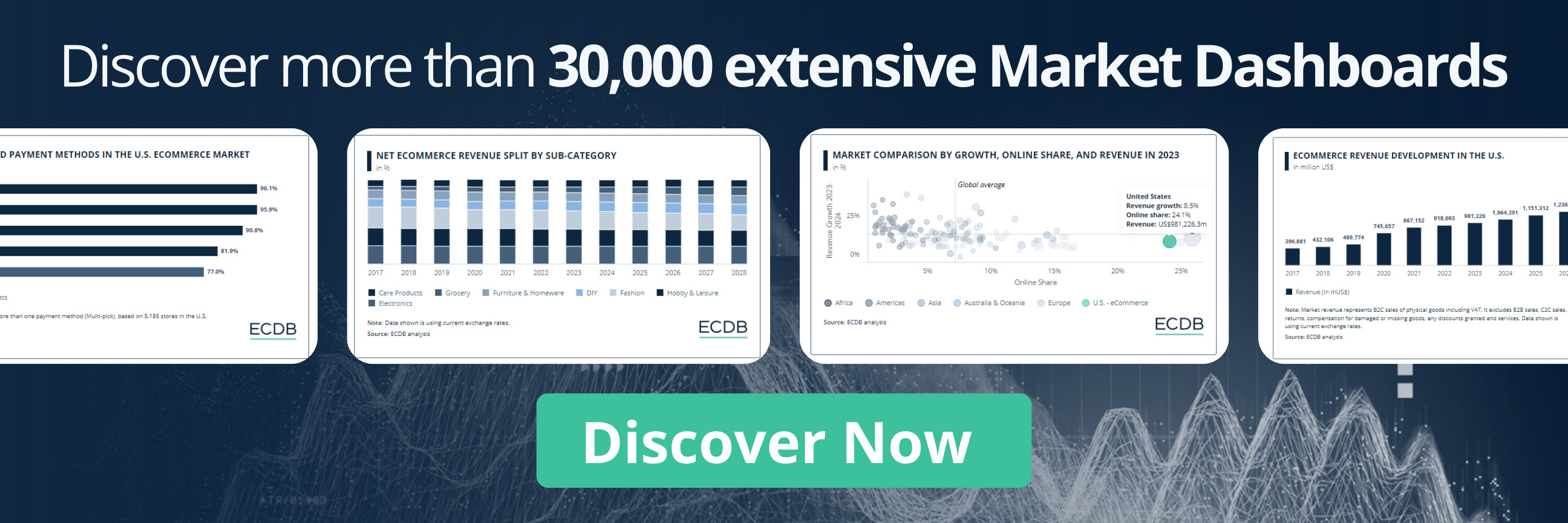eCommerce in Canada
eCommerce in Canada: Top Stores, Market Development & Trends
Canada’s eCommerce market shows steady growth led by Amazon, with digital payment methods gaining ground over traditional options and evolving consumer preferences.
Article by Cihan Uzunoglu | October 29, 2024
eCommerce in Canada: Key Insights
Top Players Shape Market: Canada’s eCommerce market is driven by a few major players, with Amazon at the forefront, followed by Walmart, Costco, Home Depot, and Apple.
Growth Trends: Following a pandemic-driven surge, Canada’s eCommerce market has now stabilized and is set for steady growth, reaching an expected US$35 billion by 2024. Popular categories include fashion, hobby, and electronics.
Payment & Shipping Shifts: Traditional payment methods like Visa and Mastercard remain prevalent, but digital options such as PayPal, Apple Pay, and BNPL are gaining ground as Canadians opt for flexible payment solutions. Canada Post leads shipping services, with FedEx, UPS, and Purolator close behind.
Neighboring the second largest eCommerce market in the world, Canada's importance in the online shopping sector can sometimes be forgotten. With projected sales of US$35 billion by 2024, we predict that Canada's eCommerce market will be the 16th largest in the world this year.
From major players like Amazon and Walmart to fast-growing categories like electronics and home decor, Canadians are fueling a market that's rich in options and ripe for innovation. So which online stores are winning over Canadians, and how are payments and shipping evolving to meet new demands? Dive in to find out.
Top Online Stores in Canada
Canada's eCommerce market mirrors the competitive structure seen in larger markets like the United States, with a few dominant players at the top. Here’s the breakdown of ECDB data:
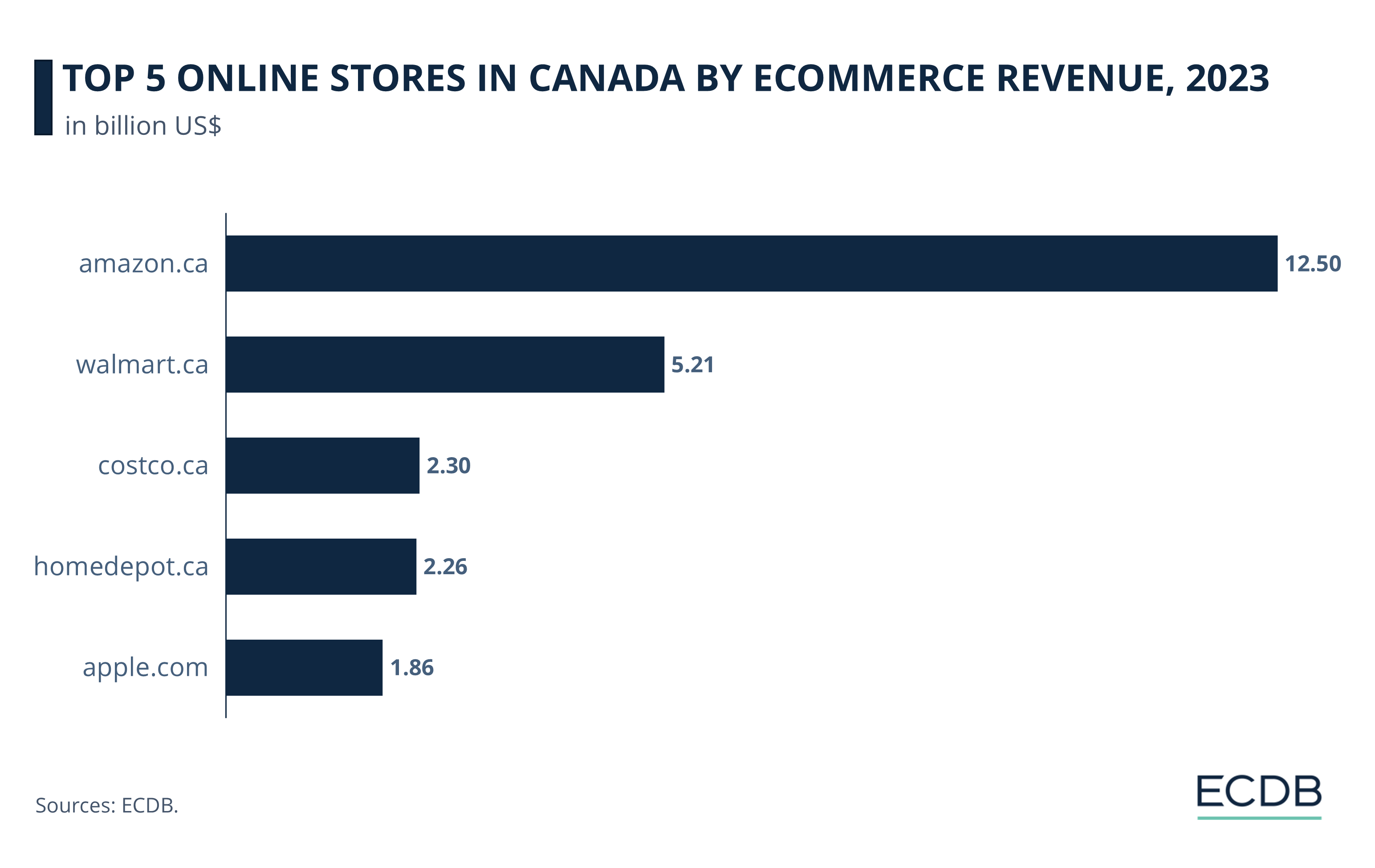
Amazon.ca leads the Canadian market, generating US$12.5 billion in 2023.
Walmart.ca follows, albeit significantly behind, with a revenue of US$5.21 billion.
Costco.ca, Homedepot.ca, and Apple.com round out the top five, earning US$2.3 billion, US$2.26 billion, and US$1.86 billion, respectively.
1. Amazon.ca
Amazon.ca remains the leading online retailer in Canada, with US$12.5 billion in revenue in 2023. However, the company is facing increased scrutiny in Canada as the Competition Bureau continues to investigate its business practices. This investigation, launched in 2020, focuses on concerns about Amazon's dominance and potential unfair practices that may harm small businesses using its platform.
Despite these challenges, Amazon.ca continues to expand, with new fulfillment centers improving delivery services, especially in Ontario and Alberta.
2. Walmart.ca
Walmart.ca generated US$5.21 billion in 2023, maintaining its strong presence in Canada's eCommerce market. The retailer has been investing heavily in its online grocery services, which have grown significantly since the pandemic.
Walmart's grocery pickup and delivery options, along with its GoLocal initiative, which offers delivery services to small businesses, have positioned Walmart as a key player in online retail. Additionally, Walmart’s focus on integrating its physical stores with eCommerce operations continues to drive growth, particularly in suburban and rural areas.

3. Costco.ca
Costco.ca earned US$2.3 billion in 2023, benefiting from its growing online membership model. In fiscal Q4 2024, Costco’s eCommerce sales saw an 18.9% increase year-over-year, driven by strong demand for electronics and home essentials.
While Costco traditionally focused on in-store bulk buying, its Canadian eCommerce platform has expanded to offer a wider variety of products and services, including same-day delivery in partnership with Instacart in major cities.
4. Homedepot.ca
Homedepot.ca brought in US$2.26 billion in 2023, catering to the continued demand for home improvement products in Canada.
Home Depot has capitalized on the rise of DIY projects, which spiked during the pandemic and has sustained its momentum. In Canada, the company has focused on enhancing its curbside pickup services and promoting virtual DIY workshops, making it easier for Canadians to complete home projects without visiting physical stores.
Valuable Insights: Our data-driven rankings are regularly refreshed to provide you with crucial insights for your business. Find out which stores and companies are performing will in the eCommerce space and which categories are topping the sales charts. Stay ahead of the market with our rankings for companies, stores, and marketplaces.
5. Apple.com
Apple.com generated US$1.86 billion in Canada in 2023, largely driven by strong demand for new product launches like the iPhone 16.
Apple continues to focus on direct-to-consumer sales through its online platform, while also expanding its physical retail footprint across Canada. Recent investments in Apple Pay have further integrated the company’s digital services into Canadian retailers, supporting a seamless online and in-store shopping experience.
eCommerce Market Revenue
Development in Canada
Canada's eCommerce sector experienced rapid growth during the pandemic, similar to global trends. However, this surge was followed by a slight dip, and the market is now projected to grow steadily over the coming years:
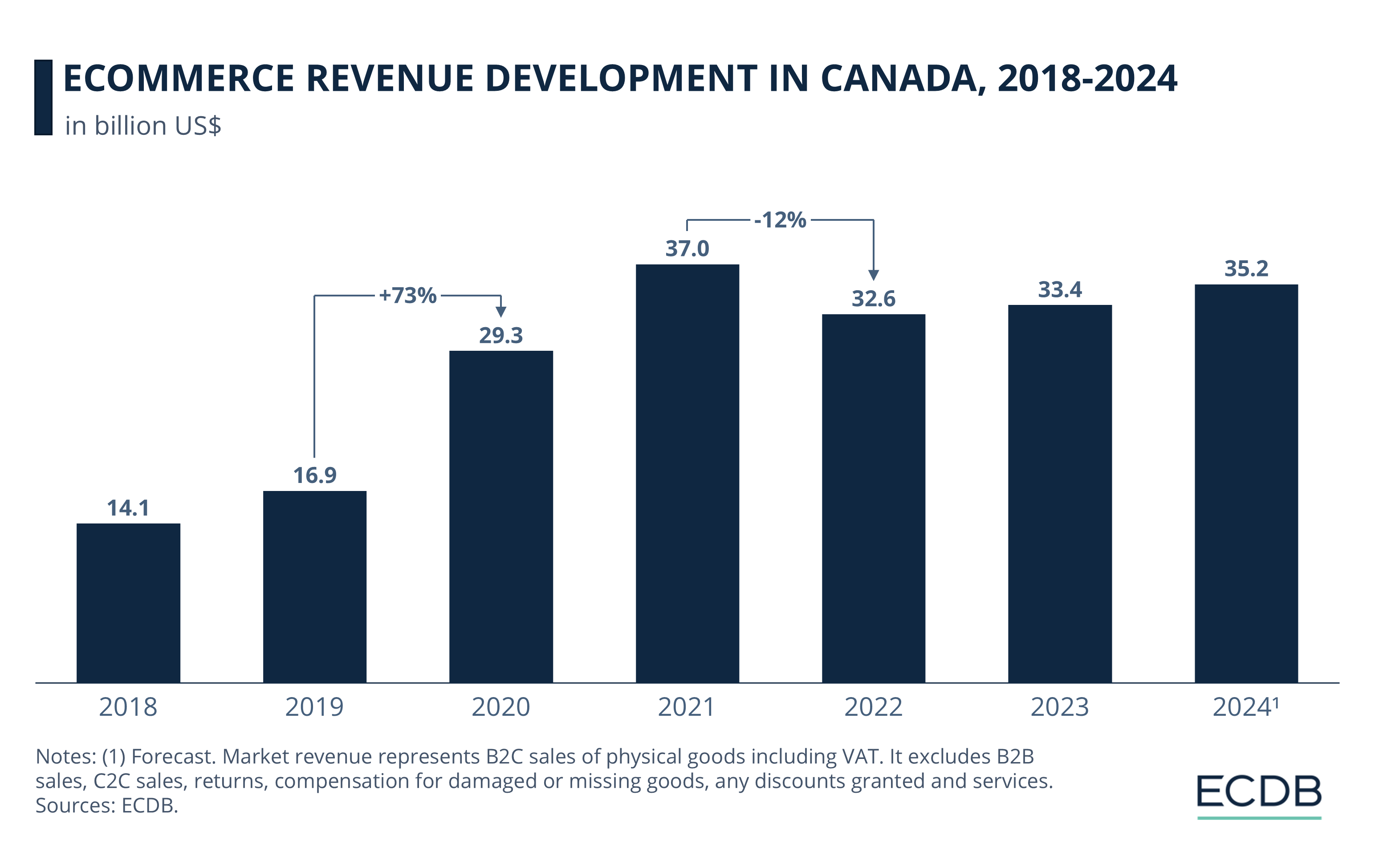
The Canadian eCommerce market grew from US$14.1 billion in 2018 to US$16.9 billion in 2019, with a pandemic-driven increase pushing the revenue to US$29.3 billion in 2020.
After reaching its peak in 2021 at US$37 billion, however, revenue dipped to US$32.6 billion in 2022 and US$33.4 billion in 2023.
Looking ahead, the market is forecasted to continue its growth steadily, reaching US$35.2 billion by the end of 2024.
Most Popular Categories for
Online Shopping in Canada
The Canadian eCommerce market is diversified, with several product categories contributing to the total revenue:
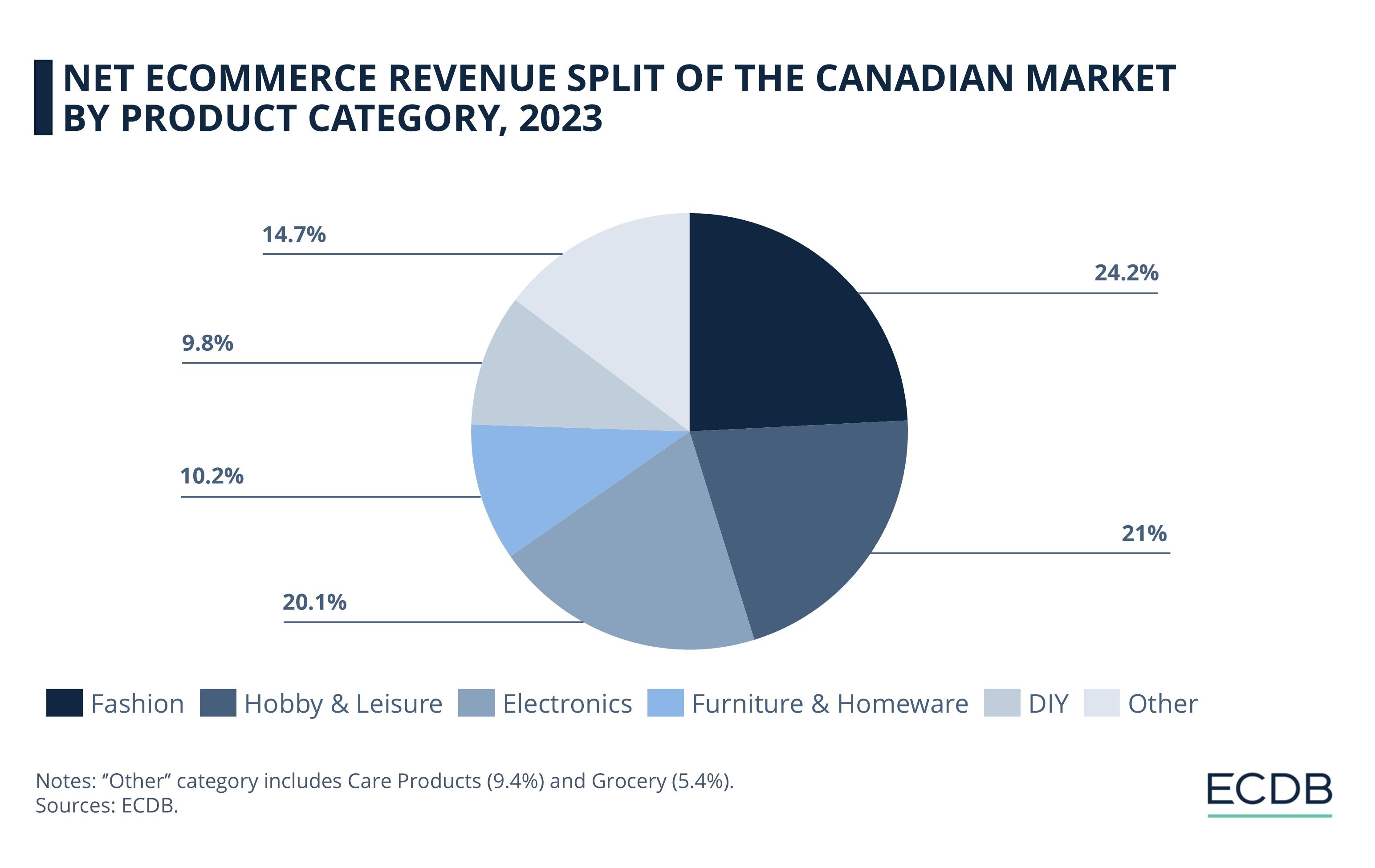
Fashion takes the top spot with 24.2% of the market, followed by Hobby & Leisure at 21%.
Electronics account for 20.1% of revenue, while Furniture & Homeware and DIY contribute 10.2% and 9.8%, respectively.
The remaining 14.7% comes from other categories, including groceries and personal care products.

Top eCommerce Payment Methods in Canada
Canadians show a strong preference for traditional payment methods, with Visa and Mastercard being widely accepted across online stores:
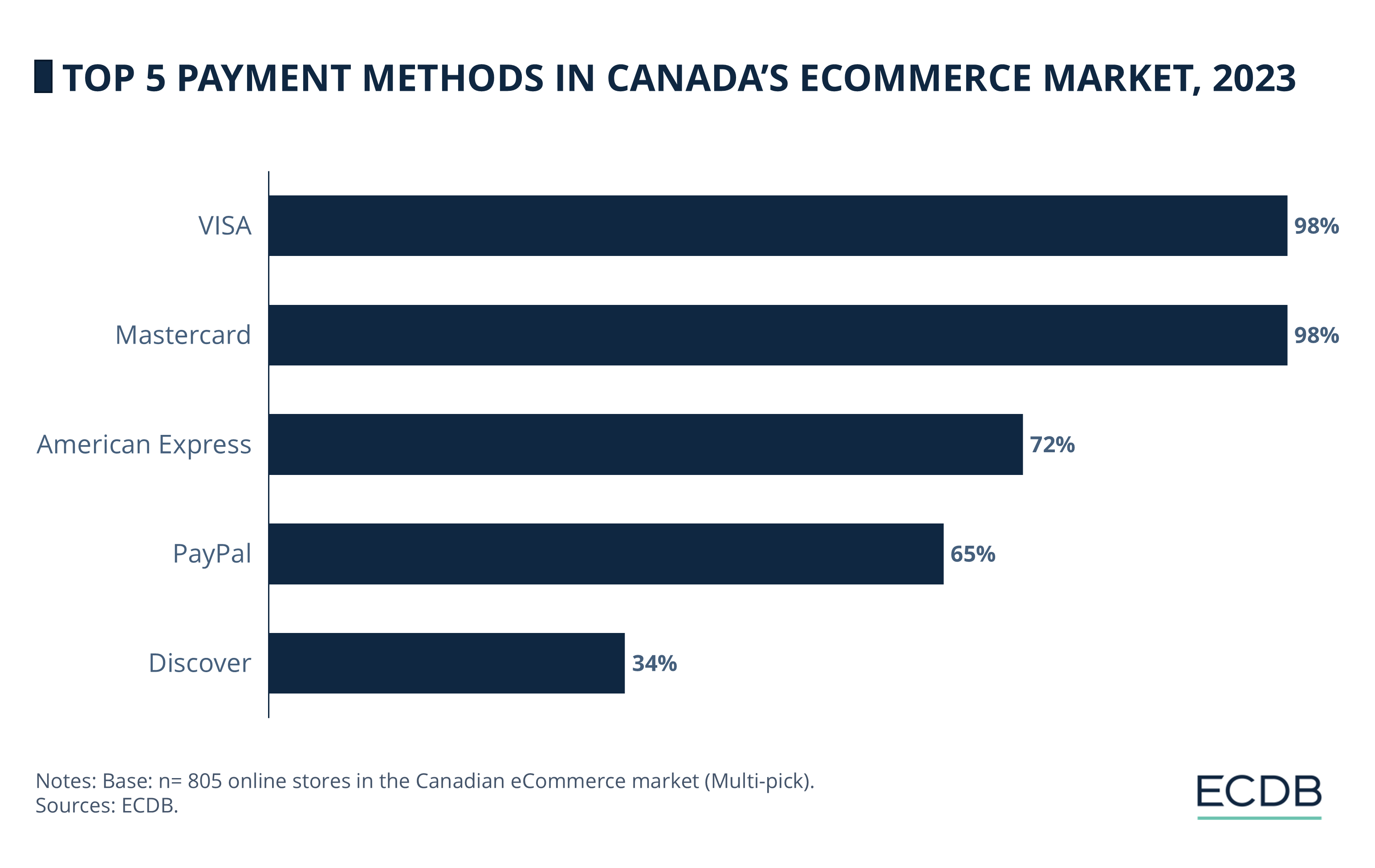
Visa and Mastercard are the most commonly accepted payment methods, each used by 98% of online retailers.
American Express is available in 72% of stores, while PayPal, a popular eWallet, is accepted by 65% of retailers.
Discover, though less common, is still used by 34% of online stores.
Digital Payment Options on the Rise
While Traditional Methods Decline
A recent report from Salesforce Research’s "State of Commerce 2024" highlights significant changes in Canadian eCommerce payment trends over the past two years. Digital payment options like PayPal, Apple Pay, and bank transfers have seen steady growth, signaling a shift toward more flexible, digital-friendly options.
In particular, PayPal's support from online stores has increased, and Apple Pay has gained considerable traction, showing the appeal of digital wallets among Canadian consumers. Acceptance of emerging payment methods, such as loyalty points and buy-now-pay-later services, has also grown, indicating a shift toward convenience-driven, customer-focused choices.
Meanwhile, traditional credit card payments are seeing a slight decline, as merchants diversify payment offerings beyond conventional methods. Although gift cards remain popular, they too have seen reduced presence as more diverse digital options become available in online stores.
Top eCommerce Shipping
Providers in Canada
Reliable shipping is crucial in eCommerce. In Canada, several major providers dominate the eCommerce market. On the top is Canada Post:
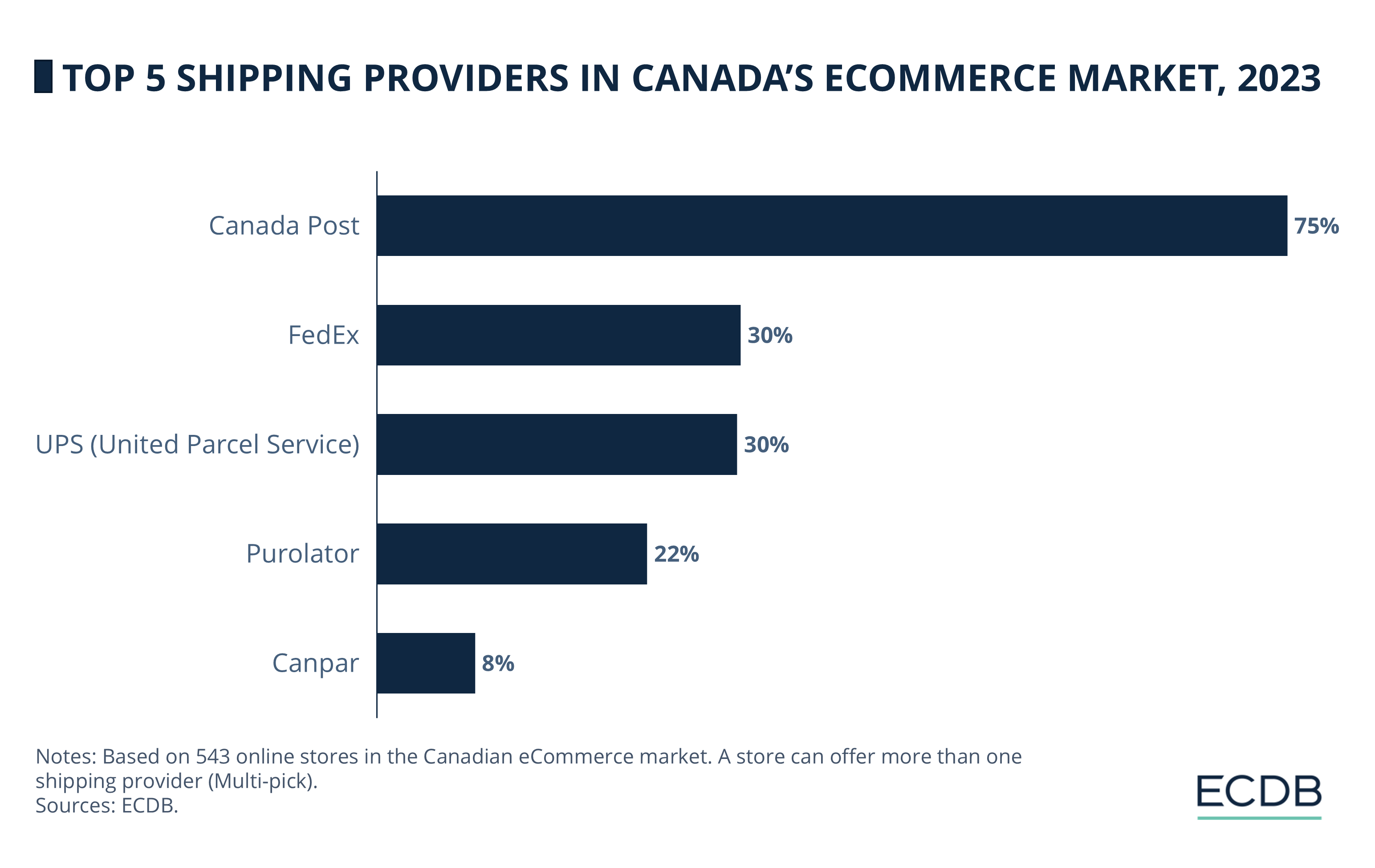
Canada Post leads the eCommerce shipping market in the country, used by three quarters of online stores.
FedEx and UPS each serve 30% of retailers, offering both domestic and international shipping solutions.
Purolator is another key player, handling shipments for 22% of stores, while Canpar, though less prevalent, is used by 8%.
Top Tips for Safe and Smart
Online Purchases in Canada
Online shopping in Canada offers a wide variety of products, including clothing, home decor, and jewelry, from a range of websites. Many Canadian eCommerce sites frequently update deals and discounts, making it a convenient option for shoppers across the country. When selecting a shopping site:
Prioritize reputable retailers with well-established brands or physical stores, such as Walmart. Check for customer reviews and ratings, and look for clear payment, return, and exchange policies.
To ensure security, only use secure internet connections and avoid using public Wi-Fi or computers for purchases.
Opt for secure payment methods like PayPal or credit cards and be cautious of sites that request excessive personal information.
Watch out for unrealistic deals, and avoid wire transfers and other unsecure payment methods that may be tied to scams. Be mindful of counterfeit products and keep personal and payment information protected.
Smart Shopping Strategies and Tools
Maximize savings by comparing prices and deals across different sites. Take advantage of promo codes, coupons, and price comparison tools to find the best deals, and consider shopping during off-peak hours for faster processing. Use trusted retailer apps, like the Walmart app, for on-the-go shopping, and look for features like free delivery or in-store pickup to enhance convenience.
Consumer Rights and Returns
Understand your consumer rights when shopping online in Canada. Review the site's return and exchange policies carefully, and keep receipts and order details on hand for any returns. If you encounter issues with your purchase, contact customer service and consider reaching out to the Canadian Consumer Protection Agency for further support if necessary.
eCommerce in Canada: Wrap-Up
As a primarily service-based economy, Canada has a strong economy – 9th in the world in terms of gross domestic product (GDP) – in addition to its eCommerce prowess. The country has also been a key member of the World Trade Organization (WTO) since 1995, and has extensive trade relations with many nations through its bilateral and regional free trade agreements (FTAs).
Supported by a well-educated workforce, multicultural and multilingual co-existence, a thriving economy, and government support for starting a business, Canada is a promising market for online shopping now and in the future.
Sources: Global News, CityNews, Digital Commerce 360, Salesforce Research, Statista, Global PEO Services, ECDB

Click here for
more relevant insights from
our partner Mastercard.
Related insights
Deep Dive
Top eCommerce Companies by Market Cap 2024
Top eCommerce Companies by Market Cap 2024
Deep Dive
Online Shopping in the United States: Where Consumers Prefer to Shop Online
Online Shopping in the United States: Where Consumers Prefer to Shop Online
Deep Dive
Alibaba Competitors: Which Companies Are Alibaba’s Biggest eCommerce Rivals?
Alibaba Competitors: Which Companies Are Alibaba’s Biggest eCommerce Rivals?
Deep Dive
The Global B2B eCommerce Market: Why It Is Beneficial to Sell to Other Businesses
The Global B2B eCommerce Market: Why It Is Beneficial to Sell to Other Businesses
Deep Dive
Temu Is the Second Most Visited eCommerce Website in the World
Temu Is the Second Most Visited eCommerce Website in the World
Back to main topics
